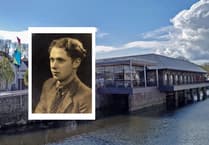Twenty-five-years-ago, Pembrokeshire was at the heart of one of the worst environmental disasters to hit Britain’s coastline.
The grounding of the 147,000-ton supertanker Sea Empress at the mouth of the Cleddau Estuary on her way to Milford Haven on that fateful day - Thursday, February 15, 1996, grabbed international headlines as the county faced a pollution nightmare which threatened its economic and environmental future.
Heading against the outgoing tide, the Sea Empress hit rocks in the middle of the channel, damaging her hull, with her cargo - 72,000 tonnes of crude oil - slowly spilling into the sea.
A cloud hung over the area’s popular resorts that was almost as dark as the mass of oil that flowed onto the beaches.
Bitterness, sadness, anger and frustration were just a few of the emotions felt by local people looking on helplessly as our beautiful beaches were desecrated before their very eyes.
A mammoth effort from armies of council workmen and volunteers offered hope that Pembrokeshire’s magnificent coastline could be returned to its former glories. And those efforts were rewarded, as evidence of the oil spill horror faded within a few years... although memories still remain.
Here we take a pictorial look (courtesy of Gareth Davies Photography) at the unforgettable events of 1996...
Looking back, local county councillor Michael Williams, who represents the Tenby North ward, said that he prays that we never ever witness such an incident again.
“I remember going to Caldey at 8.30 am that morning and when we left Tenby all looked fine but by the time we reached the Island everything was covered in a film of oil.
“My most vivid recollection was looking down from The Lion corner later that day with my daughter, and she broke down such was the shock of seeing a beach that she loved (Tenby’s North Beach) covered in a brown slime.
“We set up a ‘Clean Seas Group’ which was driven by the truly amazing Paul Cowper, and we gave evidence to evidence at the inquiry in to the Sea Empress disaster to Lord Donaldson who chaired the committee of investigation. I still have the report ‘Safer ships, cleaner seas’ - which made a series of recommendations which it was hoped would prevent such an accident ever happening again,” continued Clr. Williams.
“Unfortunately Viscount Goschen failed to carry through the recommendations in their entirety, in particular the stationing of an ocean going tug in Milford Haven which would have had the ability to rescue any ship of this type in difficulty. The compromise offered was to station such a vessel in Falmouth which is a long way from the major oil and gas port of Milford.
“I pray we never ever witness such an incident again, and we owe a huge debt of gratitude to the staff that worked for months to clean up the most awful mess.
“It is amazing how the natural environment recovered, but the loss of mammal and bird life was sickening to behold. We also had amazing support from the then MP Nick Ainger, and Mrs. Jenny Bradley who was secretary to the campaign prior to and during the inquiry,” he added.
Solicitor Paul Cowper who formed part of the action group which sought to ensure that steps would be taken to prevent such a disaster happening again, said that the sight of Tenby’s beaches and sea covered in oil was ‘horrific’.
“My first encounter with the black tide came as I drove to work in Tenby on a gloriously sunny February morning. At that time I knew that the stricken oil tanker had begun to spill into the sea some of its toxic cargo,” he remarked.
“As I approached the railings looking over the North beach the sky and horizon merged into a soft blue, seconds later to be replaced by a dirty brown sludge.
“It was a horrific sight - Tenby harbour, the jewel in the crown of Wales tourism, was no more than an oil sump.
“In an astonishingly short space of time the foul mess had blanketed the whole of south Pembrokeshire’s beautiful coastline.
“My first thoughts were of the thousands of rare sea birds that would soon be returning to their nesting sites on our famous bird islands.
“Then as the day wore on and the full impact of the spill became apparent it was clear that enormous damage was being caused to our beaches, our coastline and our tourism.
“I was to become very involved in the disaster as a solicitor seeking compensation for businesses which had suffered economic loss and as an environmentalist in a dynamic action group seeking to ensure that lessons were learned and steps taken to prevent such a disaster happening again.
“It has to be said that the clean-up was thorough and effective and a huge amount was achieved in a number of months.
“Awful as it was we learned that left to its own devices nature will prevail and the winter storms were a natural deep cleanser.
“Though large numbers of sea birds died, populations bounced back within a couple of years.
“Tourism, the life blood of Pembrokeshire, was recovering well that same year. We hope that never again are our shores blackened,” he added.




